From SMS to virtual reality: Education for all kinds of students
Entrepreneurs, innovators and non-profits are coming up with newer methods of teaching so that students across all socio-economic strata have an equitable access to education


 Akanksha Chaturvedi, 23, launched Eduauraa in September to make education affordable and accessible via OTT platforms
Akanksha Chaturvedi, 23, launched Eduauraa in September to make education affordable and accessible via OTT platforms
Image: Arpit Jain for Forbes India[br]It’s well documented how Covid-19 has amplified the existing gaps in the Indian education system. The country, which was already struggling with problems of inadequate access to education for its 600 million young people, suffered a further blow when educational institutions halted physical operations due to the nationwide lockdown in March.
Only 42 percent of urban Indian households and less than 15 percent of rural households have internet access, according to a report by National Sample Survey Office (NSSO) in 2017-18. The Remote Learning Reachability report issued by UNICEF in August pointed out, “In India, over 1.5 million (15 lakh) schools have been closed due to the pandemic, affecting 286 million (28.6 crore) children from pre-primary to secondary levels, (of which 49 percent are girls). This adds to the 6 million (60 lakh) girls and boys who were already out of school before the Covid-19 crisis.”
Education via digital platforms has been an alien concept for many underdeveloped cities in India. A survey conducted by Oxfam India in September across five Indian states revealed that over 80 percent of children enrolled in government schools had not received any form of education since the lockdown, while only 20 percent of teachers of government schools were trained for delivering classes online.
By approving the New Education Policy in Parliament, the government has taken a much-needed step towards digitisation of education in the country. The policy, which seems to be the harbinger of change for the post-pandemic world, stresses the need for making a wide variety of digital resources available and accessible for the learning requirements of students across the country.
Newer methods of teaching and coming up with innovative ways to make education accessible to children and youth, especially the underprivileged, have become the need of the hour. Entrepreneurs, innovators and non-profits have been quick to respond and strive towards provide equitable access to education across social and economic strata in the country. We look at some of the most disruptive methods and innovations that were brought to life in these testing times.
Eduauraa: as affordable as OTT
At 23, Akanksha Chaturvedi has only one vision: Use world-class technology to make quality education available in every corner of India at an affordable price. “Limited access to good education has led to a surge in tuition culture and about 11-12 percent of the average family income is dedicated to tuitions,” she says.
When she came back after completing her undergraduate studies in the US, she says she was surprised to see how many people across various socio-economic backgrounds were hooked to watching content on OTT platforms on their smartphones. This got her thinking, what if we did the same with education.
With a vision to make education affordable and accessible via OTT platforms, she launched Eduauraa via OTT platform Zee5 in September 2020. In the last two months, they have already garnered about 5 lakh subscribers. “We have deployed the best teachers from the top 10 schools in India, subject-matter experts, visualisers, animators, editors and directors to help create an engaging learning experience,” says Chaturvedi. Eduauraa can be accessed by users via its application, website or on Zee5. There are three forms of yearly subscription packages, starting with the base video pack subscription at ₹999, the value-added service pack subscription at ₹1,999 and the all-inclusive subscription at ₹2,499.
Based on the subscription pack chosen, the edtech startup also offers reference materials and resources to students like ebooks, which serve as great revision guides, mind-maps and past paper books with questions and answers. “We have included features such as the Eduauraa Proficiency Quotient (EPQ) which analyses the child, adds a personalisation factor and enables the student to schedule his/her studies,” explains Chaturvedi, who was set to launch the platform in April-May 2020, but had to delay it because of the pandemic. The platform currently offers education for various state education boards in both English and Hindi.
The startup, with a team of 250 employees, is working on expanding to other regional languages and curating content for 11th and 12th graders, followed by IIT, JEE and NEET examinations. “Additionally, we are working on materials and offerings for civil services/IAS exams that see over 50 lakh to 1 crore students appearing every year,” she adds. Eventually, Chaturvedi hopes to create a community where students from ages 11 to 36 can study with via Eduauraa.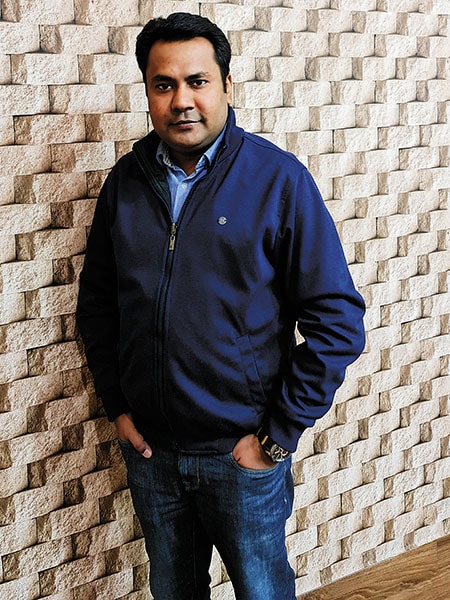 Ankur Agarwal is the CEO of VR-based edtech startup Veative Labs that provides interactive STEM modules for distance learning and virtual classrooms
Ankur Agarwal is the CEO of VR-based edtech startup Veative Labs that provides interactive STEM modules for distance learning and virtual classrooms
Image: Courtesy Veative Labs[br]Veative Labs: Virtual Reality on a Browser
Education technology provider Veative Labs offers hundreds of STEM and ELL (English language learning) modules in virtual reality (VR) for interactive learning. Since the Covid-19 pandemic spread around the world, Veative has converted their entire STEM and Virtual Tour library into a WebXR format. “The module, initially a project for UNICEF, allows students in even economically-depressed countries to access immersive content on any PC, by simply using a browser,” says Ankur Agarwal, CEO, Veative Labs.
“Our business model was severely affected by the pandemic as we deal with a VR device, which is by nature attached to the user’s face. There is an understandable reluctance to share such a device. We strategised to come up with a way to make that content available to users who are away from school, not in possession of a VR device, as well as provide analytics for teachers to monitor student activity and progress. And that made us pivot to the WebXR model,” explains Agarwal.
Veative, which was set up in 2016, encourages active, problem-based learning through virtual reality-based lessons that promote a deeper understanding of complex concepts. 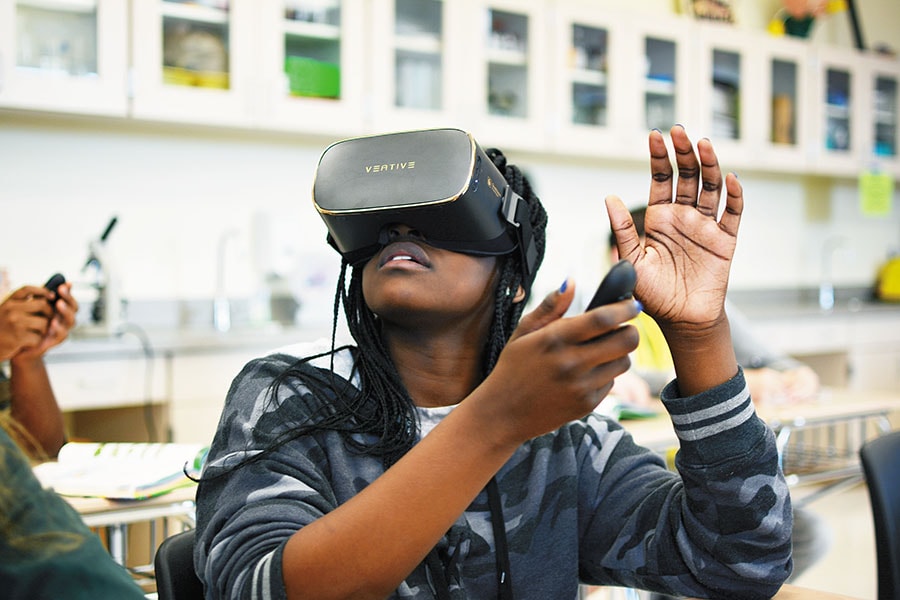 Since the pandemic, they have launched a WebXR module that will allow students without VR devices to access lessons through just a computer browser and internet connectivity
Since the pandemic, they have launched a WebXR module that will allow students without VR devices to access lessons through just a computer browser and internet connectivity
Image: Courtesy Veative Labs[br]Veative doesn’t want to be identified as just a ‘VR Company’. “We have always placed the greatest value on educational content, and less on the vehicle of delivery, which in this case is the VR device. So, for our educational VR, it was natural for us to focus more on the content and pedagogy, and less on how cool the device looked,” says Agarwal.
With three offices in India, Singapore, and the US, and a team of 100+ members, Veative Labs offer solutions to over 100,000 users in 25 countries—including the US, Canada, Japan, India, Nigeria, South Africa, Vietnam, Malaysia, UAE, Saudi Arabia.
The company, in July 2020, also partnered with Dev Clever, a UK-based company, to launch an integrated career development and immersive learning platform in India which will cover a range of aspects, from career exploration to professional development. The aim is to equip training providers, higher educators, and employers with ‘a unified and unique methodology’ to address the growing global skill requirements. “We need to prepare the workforce today for a better tomorrow. Innovative tools and methods used in schools will transform markets. With Dev Clever, we endeavour to make that a rewarding journey for all students,” says Agarwal.
PlayShifu: A Phygital Approach
Online classes are a great way to provide access to education, but kids between three and 11 years of age are eventually going to get bored listening to a teacher on screen talk about dinosaurs or wildlife.
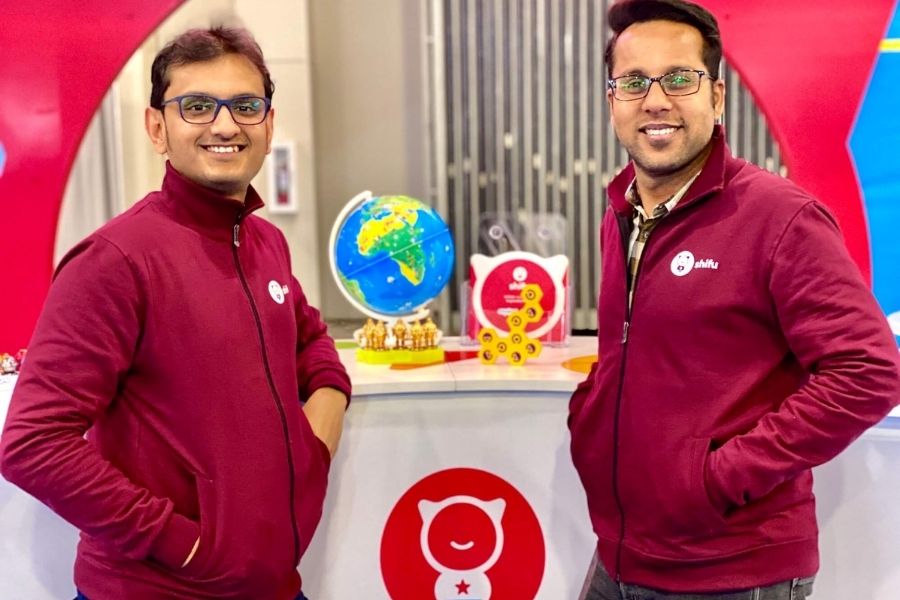 Vivek Goyal (left) & Dinesh Advani (right) co-founded PlayShifu to create unique tech toys that merge learning and fun
Vivek Goyal (left) & Dinesh Advani (right) co-founded PlayShifu to create unique tech toys that merge learning and fun
Now imagine if the child was able to learn about dinosaurs and wildlife by having these animals come to life and talk about themselves. Startups like PlayShifu are taking edtech a step forward by using technologies like augmented reality. The vision was “to make screen time meaningful, not mindless” through its phygital experiences.
The startup, launched in 2016, started off with two product lines, each with about one or two stock keeping units (SKUs), till the pandemic happened. “We set out with a mission to design one comprehensive learn-and-play platform based on innovative phygital interactions for Gen Alpha kids (3-to- 11-year-olds). In 2020, we ended up creating three different platforms,” says Vivek Goyal, co-founder, PlayShifu. Since each platform provides a phygital experience, the kits come with a physical toy that is paired with a mobile app to provide digital games. For example, a physical Earth globe “comes to life” with the Orboot Earth application.
“We saw a 300 percent surge in demand for our innovative, educational tech products after the lockdown, and we grew 300 percent in the calendar year 2020 vs. 2019. We have added 150,000 new users in 2020,” says Goyal. Currently, the company has two platforms: Orboot (various globes to learn about countries, cultures, wildlife, space missions and more) and Plugo, a gaming system that builds STEAM [Science, Technology, Engineering, Art, Math] skills through story-based challenges.
“This year, we have added two new experiences to Orboot: Orboot Dinos and Orboot Mars. We also expanded our Plugo platform from one to five different gaming kits,” says Goyal. They have also recently launched Tacto, a phygital board game system that turns any tablet into an interactive board to play with real figurines. Currently launched with two game sets, they will be adding three more by March 2021.
“Before Covid-19, our sales were 60 percent online and 40 percent offline retail. Since the lockdown, almost all retail has moved online. The boom in online purchases is more than making up for any decline in offline (retail) sales,” says co-founder Dinesh Advani. PlayShifu is not only selling via retail and online channels, but also working with educational institutions—more than 1,000 schools globally. Currently, there are over half a million children across 15 countries—including the US, UK, Canada, Japan, Germany, France and India—using PlayShifu products.
The Bengaluru-based startup raised a seed round from IDG Ventures and Parampara Capital. In July 2019, they raised $7 million in Series-A funding from Chiratae, Bharat Innovation Fund and Inventus Capital. “Apart from an exciting line-up of products being launched, we plan to expand our distribution further in our primary target markets (the US, UK, Japan, Australia, and the Middle East) through retail, online, and classroom presence,” adds Advani.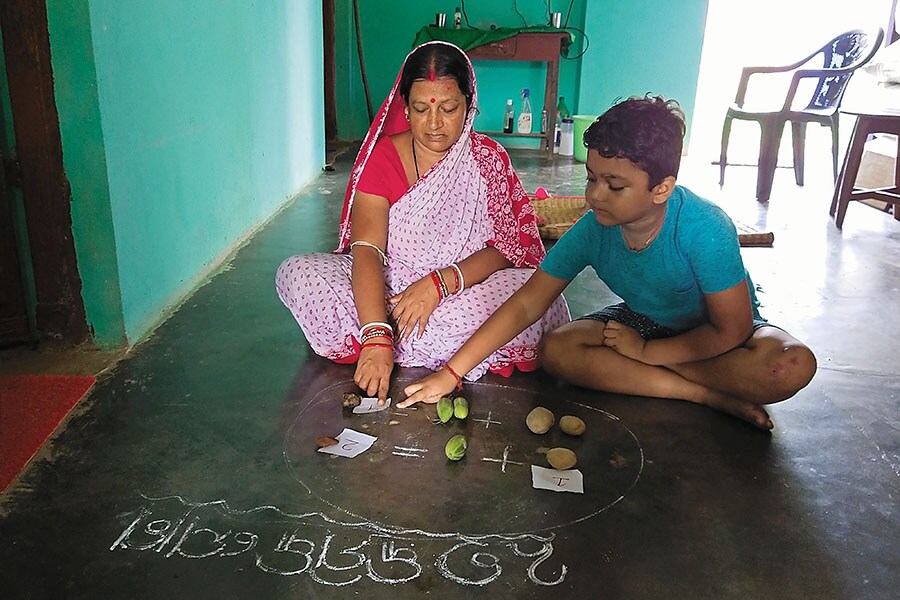 The venture instructs parents remotely through text messages and voice calls on how to engage with and teach their children
The venture instructs parents remotely through text messages and voice calls on how to engage with and teach their children
Image: Courtesy Thinkzone[br]Diganta Swaraj Foundation: Loud and Clear
Diganta Swaraj Foundation, a non-profit that works with tribal youth in Maharashtra, in mid-July came up with the ‘Bolki Shala’ (Speaking School) initiative that makes use of loudspeakers to teach underprivileged children in villages and small towns.
The initiative was first started for the students of Mokada village, where children would sit on verandas of houses or at public grounds to listen to pre-recorded lessons on life skills, general knowledge and English speaking over loudspeakers.
Bolki Shala currently serves 40 schools across 100 villages and uses local languages and dialects to explain the lessons to students with no access to digital devices. “There are around 10,000 students in Mokada block alone who do not have access to any form of online education because of multiple reasons like no internet connectivity, lack of electricity supply and the absence of smartphones,” says Rahul Tiwrekar, co-founder, Diganta Swaraj Foundation.
The foundation’s efforts toward continued education for the underprivileged have gained recognition at the World Economic Forum. “Through the use of loudspeakers, the entire village becomes a learning ground for both students and adults alike,” says Tiwrekar.
Since the nationwide lockdown in March 2020, the foundation has met with several challenges because of movement restrictions, lack of availability of radios and loudspeakers, and funding to scale up. “The pandemic severely affected our operations. The funding got restricted, and the ongoing [health care and education initiatives that required physical presence] came to a halt. Payment to staff became a core issue, but people continued to work with passion despite formal pay cuts. Eventually, we started receiving donations from corporates and individuals that helped us buy and install speakers across various villages. We also used the award money for this initiative from [digital media platform] Better India to buy speakers,” says Tiwrekar.
At the beginning of the pandemic and subsequent lockdown, the organisation initially thought of providing smartphones to students in need but soon realised the problem was deeper. “Smartphones serve no purpose in tribal areas. The idea to conduct classes on an online platform assumes that each student knows how to operate a smartphone and has a 3G/4G network for smooth streaming. We have been approached by families asking for smartphone devices. The situation worsens if the family has more than one school going kid as more devices are needed. In rural areas, where network connectivity is an issue, and the majority of families are below the poverty line, affordability and access to education became a challenge.”
The foundation plans to scale up further and reach an even wider audience. They also plan to use ‘speaking school’ platform for health care awareness too. Tiwrekar adds, “In many of the families the children are first-generation learners, so there is not much parental support. Therefore, we think the government should also look at adult education and parental awareness as a post-pandemic education strategy.”
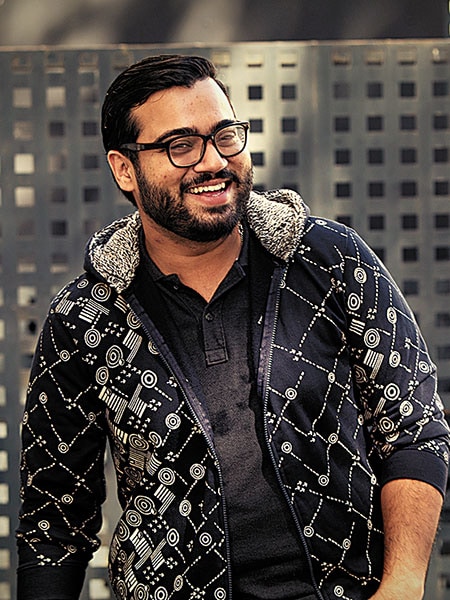 Binayak Acharya is the CEO of social enterprise ThinkZone that provides early childhood education support across four rural districts in Odisha
Binayak Acharya is the CEO of social enterprise ThinkZone that provides early childhood education support across four rural districts in Odisha
Image: Courtesy Thinkzone[br]
ThinkZone: Education, A Call Away
A Class 3 student from Bhadrak district in Odisha, Rashmi Samal could not attend a single day of class due to the pandemic since her parents didn’t own a smartphone. Technology and the internet are two must-haves for students currently with classes moving online. But those like Rashmi, whose parents can afford neither, have suffered. The Annual Status of Education Report (ASER) 2020 states that only 8.1 percent of enrolled children in government schools are using online classes and the digital medium to connect.
Odisha-based ThinkZone has been working towards improving the educational outcomes of early-grade learners (3-10 years) in under-resourced communities using a tech-plus-touch model and activity-based methodology. ThinkZone’s model usually works on implementing education programmes in the public education system, be it government schools or anganwadis. “It enables community educators, school teachers, anganwadi workers, and parents to deliver quality early-grade education programmes via data-driven mobile and voice/SMS-based technology, low-cost learning resources, and class management tools,” says Binayak Acharya, founder and CEO, ThinkZone. Founded in 2014, ThinkZone is currently working in over 400 villages, across four districts of Odisha, namely Cuttack, Kendrapara, Khordha, and Bhadrak.
As Covid-19 hit India, ThinkZone had to reinvent its model. They have started implementing a home-based learning programme for families in under-resourced communities who have limited access to smartphones and the internet.
“Parents are provided with activity-based learning content through remote instructions by phone and simple text messages, along with automated voice calls to engage with children,” says Acharya.
Rashmi’s father found out about ThinkZone’s home-based learning programme and dialled the toll-free number and followed the instructions. Rashmi liked it so much that her parents now regularly call and listen to new activities. Rashmi is one of the 1,000-plus students that ThinkZone is helping.
In case children want to revisit the content, parents are provided with a toll-free number. Additionally, parents get bi-weekly live phone calls from teachers to provide a walkthrough of these learning activities. These are modules that can be understood regardless of their literacy level. “We have tied up with the government of Odisha to implement the programme on a much larger scale,” says Acharya. The social enterprise has raised funds from BPCL, INVENT (Department of Science and Technology – Government of India, DFID, UK, and Villgro), and Startup Odisha (Department of MSME, Government of Odisha) and a Pre-series A investment from impact investor Gray Matters Capital.
While the education landscape has changed drastically in the country, a lot more needs to change. Acharya adds, “There is a wrong notion that edtech is reaching all. The definition of edtech, which is internet and smartphones and mobile app, needs to be widened.”
ConveGenius: Chat-based Schooling
ConveGenius is an edtech social enterprise that offers a set of personalised and adaptive learning solutions—backed by research in the science of learning, AI, and nudge theory to enhance the quality of content—for lower-income households. “We aim to reduce the wide learning gap in India and make edtech a reality for the 200 million students living with limited resources,” says Shashank Pandey, co-founder and president, ConveGenius. “While major edtech companies charge anywhere between ₹20,000 to ₹2 lakh for their annual services, a large section of the country is at the bottom of this funnel that cannot afford it,” he adds.
When their flagship product, CG Slate, a self-learning tablet designed for students inside the school premises, couldn’t be used because of the lockdown, they launched a WhatsApp-based Chatbot solution that brought the enterprise a 14X growth in 2020. They also acquired Gray Matters India (GMI), a leading assessment company, in August 2020 to augment the personalised learning platform.
“Unlike the other online learning services, this AI-based platform can work on smartphones with 2G/ 3G internet connections. The entire curriculum-mapped content is made available through a simple WhatsApp chat that allows more than one student to take asynchronous classes from a single device,” explains Pandey. The platform provides formative assessments, individual feedback and content recommendations, he adds.
ConveGenius had been growing steadily since its inception in 2013 and became profitable in FY2019-20 with gross annual revenue of ₹18.4 crore. They have received ₹20 crore till date from investors including Michael & Susan Dell Foundation and Benori Ventures, among others.
Currently, this WhatsApp-based edtech model is running in six states, including Madhya Pradesh, Rajasthan, Maharashtra, Uttar Pradesh, Punjab, and Himachal Pradesh. According to Pandey, “More than 7 million students studying in affordable or government schools in India are using our edtech platform on WhatsApp, Android and the web.”
The company plans to increase its reach to 10 million students by March 2021. “In the long run, we plan to close the gap in educational achievement for the bottom 100 million students in India,” says Pandey.
First Published: Dec 08, 2020, 14:43
Subscribe Now